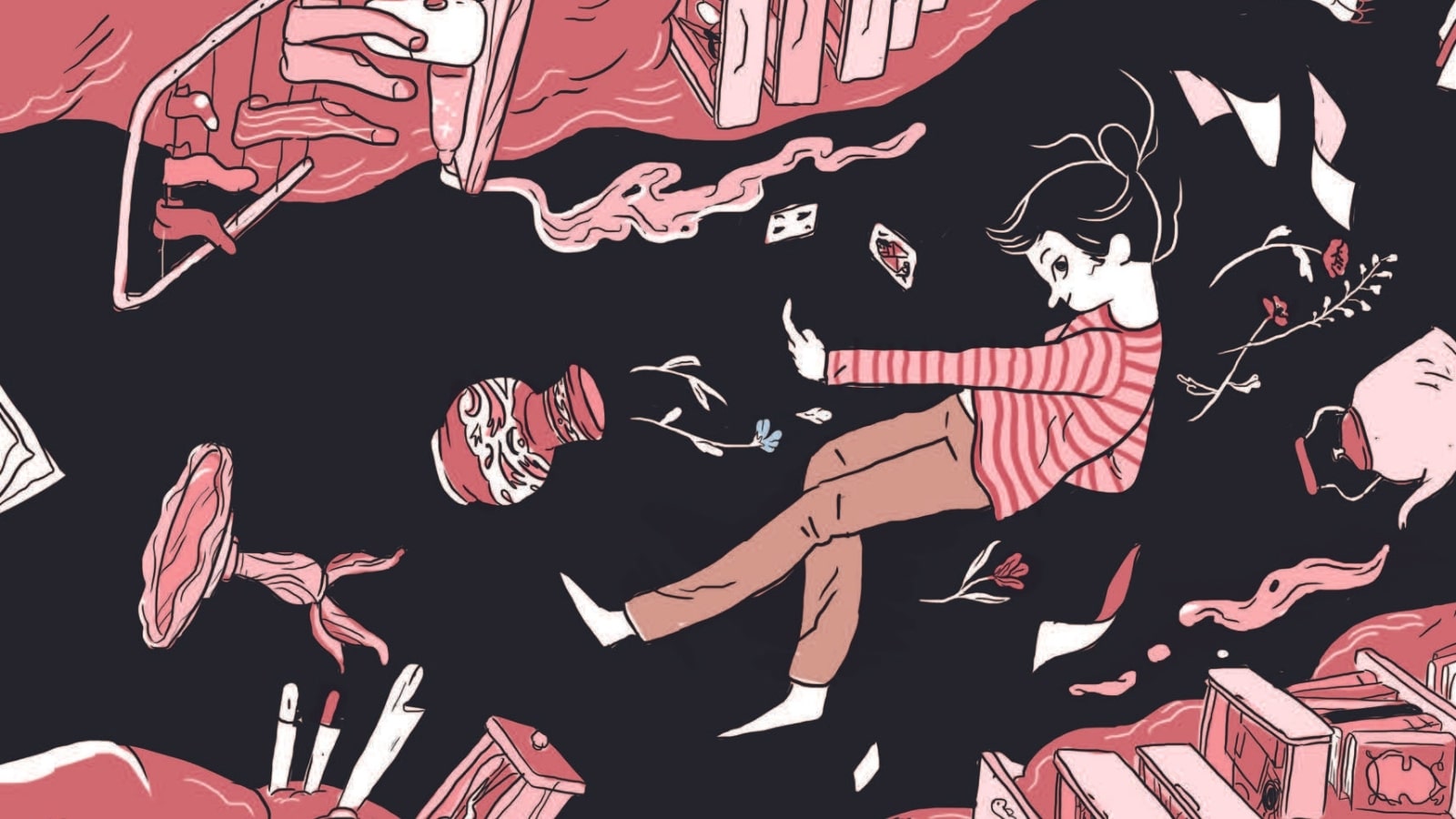The cycle of “the new things is awesome!” to “we are so over it!” has accelerated to mere minutes. Case in point: The Walking Dead. Only last week it was on the cover of EW with a triumphant story:
To be clear, no real persons alive or undead were harmed in the filming of that scene. (Your fake-guts recipe: faux blood, Vaseline, K-Y jelly. Mix and enjoy!) To be even more clear, The Walking Dead— developed by Oscar-nominated filmmaker Frank Darabont from an acclaimed comic book by writer Robert Kirkman—is a monster smash, one that’s being hailed as the year’s best new series. Debuting on Halloween to record-breaking ratings for a basic-cable drama, this great and gory end-of-the-world epic has stunned industry observers by holding strong, averaging 5 million viewers a week—more than twice the average of AMC’s now-second biggest hit, Mad Men. The network has already ordered a 13-episode second season that may not arrive until next fall. That may sound like an interminable wait for fans (call them Undeadheads), especially since the first season concludes on Dec. 5 after only six episodes. Then again, Halloween does seem like the most wonderful time of the year for a zombie saga. In the words of exec producer Gale Anne Hurd (The Terminator): “Why mess with a good thing?”
Please: Don’t. While it’s way easy to define The Walking Dead by its outrageous horror-genre violence and viscera (never has a TV series more indulged a blood-splattering head shot), what makes it a cut above is its brainy envisioning of a terrifying apocalyptic meltdown that leaves human characters struggling for physical and spiritual survival by snaring them in one moral quagmire after anothe
But already, tales of behind the scenes turmoil as Deadline reports producer Frank Darabont has let go of the entire writing staff and could possibly go to a more experimental BBC-style freelancer system, hiring various writers to write the episode. Or maybe he’ll write them all himself.
Darabont, who hails from the feature world with The Young Indiana Jones as the only series credit before Walking Dead, ended up writing 2 of the first season’s 6 episodes of Walking Dead – the pilot and the second episode – and co-writing/rewriting the other 4. Two of those 4 were written by non-staff writers, one by executive producer Robert Kirkman, on whose comics the series is based, and one by Glen Mazzara. The freelance model is employed by the Starz/BBC series Tourchwood, which in turn borrowed it from the U.K. where the show originated. Having BBC as producer has allowed Torchwood to proceed with no writing staff but I hear such a plan on an U.S.-based network series such as Walking Dead may face issues with the Writers Guild. And, while the first season of Walking Dead was only 6 episodes, its second-season order is for 13, which may prove harder to manage in pre-production, production and post-production with no writing staff. Sources tell me that no final decision has been made yet with all options open, including using some combination of a writing staff/freelances. There is time – AMC is mulling launching Walking Dead’s second season the way it did the first one – in October during Fearfest.
Darabont, director of one of the most beloved films of all time in THE SHAWSHANK REDEMPTION, has in recent years gotten a bit of a reputation as a Hollywood “maverick” — which is studio code for one of two things
1) off the rails
or
2) someone who doesn’t listen to what studios say
You can pick your option here. American TV shows are traditionally written “in room” with a bunch of white men who went to an Ivy League school sitting around and throwing around ideas, hammering out story points and so one.
At the BBC, assignments are given out to freelance talent, much as in the comics system. American TV’s accelerated schedule would make this a bit more complicated but perhaps it’s time to experiment.
The Walking Dead’s success is definitely kudos-worthy for whoever wants to claim birthrights — the fifth episode rated higher than even the pilot, although AMC keeps changing how they measure the ratings. It’s similar to how the comic, against all odds, built a higher and higher readership every month for years. The setup of human drama against the backdrop of constant, low level death threats is both a Darabont signature and something he handles extraordinarily well — and something that people are coming back for.
People have been kvetching about the script tropes, and yeah, the cliches of rednecks and noble nursing home attendants are a little frayed, but the execution is on a high level.
Some are wondering where this leaves creator Kirkman, who wrote episode four of the mini-season? The EW piece has Darabont and Kirkman huddling on an endgame to prevent Lost-itis, and he’s reportedly slated to write at least one episode for season two.
“My next big conversation with Robert, now that we’ve gotten through the first six, will be: ‘What is your endgame, Robert? I can’t believe I have not asked you this!’ I kinda wanna know Robert’s idea, for my own sanity and purposes,” says Darabont. “I’ll let you know what he tells me.” No worries. We’re not in a rush for The Walking Dead to die anytime soon.








I go from reading this article, headlined “Has The Walking Dead jumped the shark?” and note the Related story, headlined “Has YouTube jumped the shark” — and I am forced to wonder: Has jumping the shark jumped the shark?
Jumping the Shark has jumped the shark. Its time to retire not only the phrase, but its application to things that are so new they’re no where near a ramp, a beach or a shark.
Shifting the conversation away from shark jumping, whether it makes him a maverick or not, I think this is a good move on Darabont’s part. The first and second episodes he wrote were markedly better than the others. It’s a bold choice that will hopefully make for better scripts.
Having an endgame in sight already is actually a brilliant idea, while i’m not on board for Walking Dead like other are. I can appreciate the show’s quality and the last thing they need is to follow LOST off a cliff whenever the end comes. Regardless of how he wants to end the show at least have a real ending and don’t make stuff up as your going along only to have everyone be dead in the end.
“Darabont (…), has in recent years gotten a bit of a reputation as a Hollywood “maverick” — which is studio code for one of two things
1) off the rails
of
2) someone who doesn’t listen to what studios say.”
Since he is good director, I’ll go with number 2. Which is probably driving the studios crazy. Well, they had it coming.
Freelance TV script writing is hardly a new thing. It was the standard model up until the 80’s.
Dunno about the US but in the U.K. it’s always worked that way, seems to get good stories. The only place that doesn’t happen I think is in the soaps in the UK and that’s because they have such a backstory you need to have a cohesive team.
AMC needs to strike while the iron is hot. Don’t wait for Halloween next year! Get it out during the summer!
Micah
Then the show would conflict with Tru Blood.
And that would end up being a turf war.
~
Coat
Studios hate hate HATE it when a producer/director has a successful property and doesn’t owe them ANYTHING…when that happens, they quickly start a disinformation campaign designed to paint him as a weirdo, a control-freak, someone who doesn’t “play well with others”…meaning he’s someone who won’t let THEM take partial credit for the success.
I think Darabont learned over the course of producing these first six episodes what worked and what didn’t…and is tweaking the way he’s going to produce the series on an ongoing basis, since he now knows it’ll be around a while. Producing a 13-episode season will be different from what amounted to a six-hour mini-series…
Jumping the Shark is used when a show made poor narrative choices that lead the show off in a bad direction.
I don’t see this at all with TWD. This article, which is interesting, is all about production and who writes what.
I hear Darabont is looking to forgo having a writing staff for the second season of Walking Dead altogether and assign scripts to freelancers..Anyway the Show is wow..it’s a rating giant ! Can’t wait to see season two.
So… who is the show runner and who is the story editor?
Kirkman has said often in his letters pages that there is no ending, he’d be happy to write the series forever. That would be an interesting conversation.
I see problems with that. After all, zombies aren’t natural. They don’t think, don’t plan, don’t mate, don’t reproduce. They kill and eat. If the series never deals with the cause of the zombies and just treats them as low-level threats that are constantly present but can be warded off, and the focus is on the humans and their relationships, then those people have better lives than, say, people in Afghanistan and some African countries who wake up each morning and can wonder whether they and their loved ones will still be alive at the end of the day. Horror shows and movies shouldn’t be pleasant escapes from reality.
SRS
@Synsidar – in the comic the threats ARE the human relationships. Characters you come to know are threatened by other characters, not just zombies. People crack and do terrible things to each other. Sometimes they are easily defined ‘bad guys’ and other times they are regular folks that just snap.
The zombie outbreak is the cause of the society breakdown. Their involvement is limited beyond that, making the cause of their “birth” moot. This comic could easily exist (with some tweaks) after a nuclear winter as well.
“The zombie outbreak is the cause of the society breakdown. Their involvement is limited beyond that, making the cause of their “birth” moot. This comic could easily exist (with some tweaks) after a nuclear winter as well.”
yep… something like The Road could have easily been a zombie movie. Good Idea… have Cormac McCarthy write an episode.